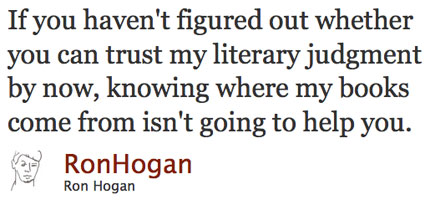Disclosure, Transparency, Legitimacy: Background Links

Here are links to some old GalleyCat posts that expand upon the context of some of what I was getting at in my Book Blogger Con presentation:
Last October, the Federal Trade Commission introduced a set of new guidelines on when bloggers should disclose the receipt of consumer goods, guidelines I viewed as too restrictive because they served to delegitimize online media. I also had serious misgivings about federal regulation of editorial content—misgivings that were shared by enough other people that the FTC eventually clarified that they were only trying to regulate a certain kind of blog, and hadn’t intended to round up all blogs in their regulatory lasso.
The FTC’s initial stance, however, did raise important questions about who gets to be a legitimate book reviewer, questions I’ve been dealing with for years, because insecure book reviewers have a habit of attacking bloggers and refusing to give them respect.
31 May 2010 | uncategorized |
My Take: Professionalism and Ethics in Blogging
Shortly after I started working at Houghton Mifflin Harcourt in January, I found out about plans to organize a Book Blogger Convention around the same time as BookExpo America, and I contacted the organizers and offered to take part in any panels they’d like to have me on. Eventually, we decided on a solo presentation about “professionalism and ethics in blogging,” with at least some attention paid somewhere in that hour to best practices for blogger/publisher relations. The idea was that it would be cool to have somebody from the industry side sharing that perspective; as it happened, HMH had discontinued my position four days before my speech—but it didn’t really matter what job I had the day I spoke to that audience. I’d already built up the perspective, and I was ready to share it.
You should watch all 26 minutes for the full argument as I made it that day, but here’s the gist: Paid book critics at newspapers, magazines, and other media outlets who attacked bloggers for being “unprofessional” missed the point; if bloggers failed to live up to a certain “professional” standard, it was mainly because that standard was defined by people who were doing one type of writing about books to champion that way of writing about books. Bloggers not only reaffirmed that there were other ways of writing about books, they proved that a substantial audience existed for that writing—proved it to such an extent, in fact, that just about every major print news publication with an online presence and a books section has launched its own blog, conceding the viability (we won’t say superiority) of the format. That’s what I mean when I say “the war between book critics and bloggers is over, [and] the bloggers won.”
30 May 2010 | uncategorized |

 Our Endless and Proper Work is my new book with Belt Publishing about starting (and sticking to) a productive writing practice.
Our Endless and Proper Work is my new book with Belt Publishing about starting (and sticking to) a productive writing practice. 
